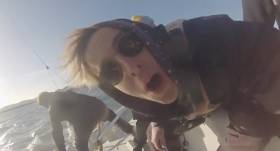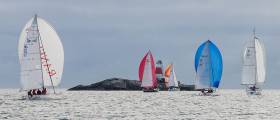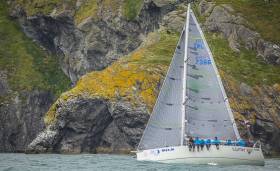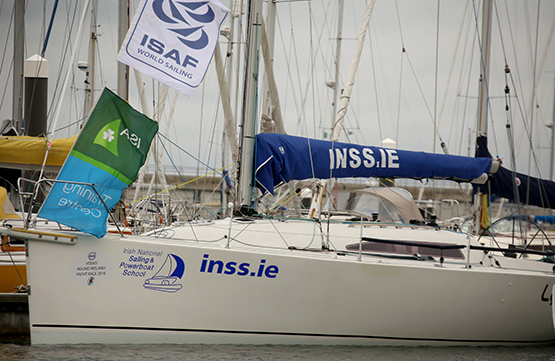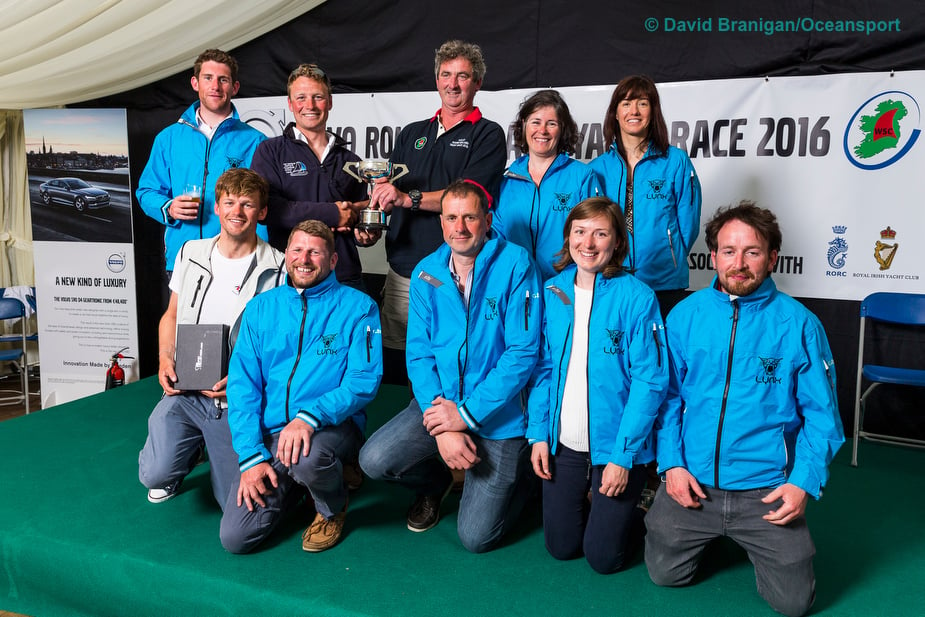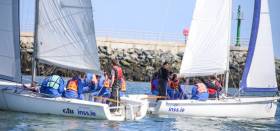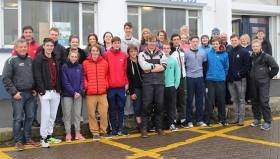Displaying items by tag: INSS
Turkey Shoot Video Highlights from INSS 1720s
Here's some highlights of Team INSS.ie in the first race of Sunday's 2016 DBSC Turkey Shoot.
Two boats, one skippered by Kenneth Rumball with a crew of race novices and the second by some of the INSS instructors took part in very breezy conditions.
Dun Laoghaire Sailing School Steps Into Strike Day Breach
#INSS - School was out for thousands of teenagers across the country due to yesterday’s ASTI teacher strike – except for one group of students who swapped their classroom for the sea.
The Irish Times reports on the Irish National Sailing and Power Boat School’s special sailing day for pupils affected by the strike on Thursday 27 October.
Fifteen youth sailors who normally take to Dun Laoghaire’s waters on Saturdays got in an early training session, which the sailing school believes would help keep them focused on learning and keeping active in their time off.
The INSS also provides after-school courses for budding sailors, as previously reported on Afloat.ie.
INSS Boat Charter For Frostbite & Turkey Shoot Racing for Adults & Juniors
As the last of the summer racing series in Dublin Bay come to a close, thoughts soon turn to the winter racing series of the DBSC Turkey Shoot & DMYC Frostbite series. Buoyed up by demand, the Irish National Sailing & Powerboat School in Dun Laoghaire Harbour is offering sailors who may not always have the opportunity or access to boats to charter dinghies and keelboats from the Irish National Sailing & Powerboat Schools fleet writes Sailing Shool Principal Kenneth Rumball.
We're delighted to offer our meticulously maintained and race readied 1720s for charter during the DBSC Turkey Shoot and DBSC Spring Chicken Series to past course attendees allowing them to take the next step and race without one of our Team INSS.ie Skippers on board. In addition to the charter, we will also be providing some pre-series coaching to help the team come together and iron out any kinks that may slow you down. More information is available here.
In addition, we will also still be racing our 1720 race boat that is represented at the 1720 class events around the country with spaces available on this boat for those who are less experienced to charter a boat and really want to experience a full on sports-boat raced as hard as possible towards the top end of the fleet.
For the DMYC Frostbite Series we are offering junior and adult sailors alike the opportunity to Charter our fleet of Laser dinghies and Topaz Vibe double handed dinghies.
Uniquely the charter also comes with training weekend before the series to ensure you are fully familiar with your boat prior to racing and pre and post race coaching on the spot. The coaching will primarily be focused on pre and post-race briefings and de-briefings as the racing will be “live”, coaching cannot be delivered during the race. Team INSS.ie skippers will themselves be racing on the very same course. A comprehensive review of the weather forecast and other relevant factors will be covered, with a view as to what tactics can be employed to give each competitor the best advantage. After the race we will review the course, the decisions that the INSS.ie skippers made. In addition, sailors will be asked to share any of their specific experiences from the race.
Full information and pricing is available here.
Irish National Sailing School's Lynx is First School Boat in Round Ireland Yacht Race
INSS School principal and skipper Kenneth Rumball reviews his tenth place overall in Volvo Round Ireland 2016 on board the INSS Reflex 38, Lynx.
The idea for the Irish National Sailing & Powerboat School to compete in the Round Ireland Yacht race was hatched even before the company planned to enter into the yachtmaster business. In fact when selecting a yacht for our competent crew, dayskipper and yachtmaster teaching duties, we made sure to select a boat that could not only fulfil our teaching duties but could look after an amateur crew while also competing at the highest level offshore.
Our Reflex 38 spent her first year primarily away from racing duties before undergoing significant race preparation ahead of this year’s Round Ireland Yacht Race. Our hull was stripped back and freshly antifouled, electronics upgraded, sheets and halyards replaced along will a full sail valet and re-measurement, this all topped off with a full IRC re-measurement in an effort to reduce our TCC ahead of the race.
Meanwhile we started to advertise our campaign for the year ahead which included not only the race but 2 dedicated training weekends along with 4 ISORA training races to ensure our crew was fully prepared along with the boat ahead of this year’s race. Lynx performed well in this training races, coming 4th in the Dun Laoghaire to Holyhead and 5th in the Dun Laoghaire to Isle of Man.
All set for the off – the INSS Reflex 38 in Dun Laoghaire
All set, our crew for the Round Ireland left Greystones Marina on the 18th of June for the race we had been preparing for all year. Keeping our noses clean at the start, we got clear early and made big gains by going close in under Wicklow head to be one of the first boats heading south. Pulling nicely in the first two hours, unfortunately we got stuffed in a no wind hole off Arklow. Going again we made good ground to round Tuskar in the leading pack before heading south into the building breeze. The breeze built and built and in changing down through our sails we unfortunately blew out or number 4 jib, eventually bringing us down to storm jib and two reefs in the mainsail, below is one our crew’s recollection at this time;
“I’ve never done a long offshore race before. In fact I only started sailing in April this year, so to say I was out of my depth on the Round Ireland is an understatement. However, I was somewhat cautious and logical, so I completed a few courses with INSS on the run up to the to the race including Sea Survival. During this course, among other things, I briefly learned about a storm jib and trysail. I was told I would probably never need to use this type of sail, but it was good to know. Come Sunday night off Cork, day 2 of the Round Ireland, the breeze picked up and I watched our torn number 4 headsail being bundled down the companion way with a calm call for the storm jib. Jaaaysus, I thought, storm sails, storm sails? What's next? What was the next module on that course? I think it was boarding a life raft...”
Once we got around the Fastnet, we were able to crack sails for a great yacht up the west coast, it got a bit breezy at one point where we blew out our A5 in about 35kts of breeze off Galway which forced us to move to our S3. With the clearing weather, we had a great sail around Tory Island while we calculated our approach to the notorious tides around Rathlin Island. Much to our surprise, we hadn’t done a good job of getting to Rathlin on time, we had in fact NAILED our timing, giving us a great run down toward Belfast Lough.
In good breeze we continued on a beat down the Irish Sea before being becalmed in Dundalk Bay. Here we struggled on the last night to get into the land breeze where unfortunately some of the lead boats got away… We spent most of the last night drifting trying to sniff any breeze out with the code zero. It wasn’t until the next morning off the Baily that we got going again to sail in good breeze into Wicklow.
Lynx finished after 5 days and 49 minutes in the 2016 Round Ireland, coming 4th in class 3, 10th overall and 1st Sailing School boat! It was a fantastic race where I am ever grateful to the crew who for some it was the longest they had ever spent at sea and who all performed admirably throughout the race, they would be a real asset to any offshore campaign in the future. Special thanks also go to Conor Kinsella and Luke Malcolm whom I really would have struggled without their talent and dedication.
See Round Ireland tracker here Afloat's Round Ireland 2016 coverage is here and download overall results here
Last Sunday, Dun Laoghaire's Irish National Sailing and Powerboat School held its 2016 Open Day in association with Irish Sailing Association's 'Try Sailing' programme.
50 new people to the sport experienced the thrill of sailing onboard a 1720 sportsboat while 64 people enjoyed kayaking and Paddle-Boarding. Check out the video below:
The Irish National Sailing & Powerboat School has been active this winter in anticipation of a busy summer season writes Principal Kenneth Rumball. Through various acquisitions the following additions to the INSS fleet have been made, 13 sit–on Kayaks, five double Kayaks, three rescue boats, 14 Laser Pico Training dinghies, 12 Topper dinghies, two topaz dinghies, three Topper Vibe dinghies, 10 Optimist dinghies and the purchase of another 6.5m fast RIB for our busy powerboat courses.
We have recognised a growing demand at the Irish National Sailing & Powerboat School and we are being proactive in our purchase of equipment ahead of what we hope will be a busier than ever season! Our latest additions show our commitment to continue to be the leading Sailing & Powerboat Training centre in Ireland catering for everybody from the novice power-boater or sailor in dinghies and yachts to a seasoned racer looking to upskill or the experienced power-boater looking to take his skill to the next level. With the current fleet size of sailing and powerboats in the INS&PS standing at over 200 boats, we certainly have the capacity to get everybody on the water.
Our new fleet of course requires more instructors and for this we have been busy training staff not only to fulfil the demands of the Irish National Sailing & Powerboat School but also of the country of Ireland. The Easter break was particularly busy with an ISA Dinghy Instructor Course run before the Easter weekend with 8 attendees and then after the Easter weekend we ran an RYA Dinghy Instructor Course with 18 attendees. We also ran possibly the first RYA Cruising Instructor Course to be held in Ireland over the break, training instructors to the level required to teach up to Day Skipper Practical level on the new ISA and RYA Cruising schemes. Not forgetting the other ISA Dinghy Instructor Courses, RYA Powerboat Instructor Courses that have already been run this year.
Here is a quote from one of our newest dinghy instructors;
“I'm just after completing my dinghy instructor course in the INSS and am so excited now to be able to pass on my skills to younger sailors and adults alike! The course was tiring at times but we all learnt so much and really enjoyed ourselves. It really was a fantastic week and year of training.” - Clodagh Quinn
Now that we have the extra boats and staff in place, we are gearing up for what we hope will be a busy and enjoyable summer.
Dun Laoghaire Sailing School To Contest 2016 Round Ireland Race
2015 was a busy year for the Irish National Sailing & Powerboat School and the school is hoping to be even busier in 2016 writes school principal Kenneth Rumball.
2015 was a huge year of change for the Irish National Sailing & Powerboat School. With thousands of sailors introduced to the sports of both sailing and powerboating at all levels. 2015 saw us invest hugely with the addition of LYNX our first yacht and new powerboats including a 9m and 6.5m RIB. We were delighted to be successful in all areas teaching new persons to sail and introducing old clients to the thrills and spills of dinghy, keelboat and yacht racing.
2016 is already looking to be just as challenging with LYNX currently undergoing a refit ahead of the Round Ireland Yacht race where we have already nearly sold all the places available for the trip around. 2016 will see us invest further in our dinghy fleet with new purchases already underway.
We look forward to helping you in 2016 with whatever course you need.
INSS Sailing Instructors Second at DBSC Turkey Shoot 2015
In an exciting 2015 Dublin Bay Turkey Shoot Race series the Irish National Sailing & Powerboat School Instructors on the 1720 ‘Key Events’ took second place overall while the Irish National Sailing & Powerboat School Race Training programme moved up through the rankings to finish joint 3rd on their 1720 ‘Oi!’
The INSS had their usual entry from their Race Training programme skippered by Kenneth Rumball where Heather Blay, Orlagh Connor, Pete Counihan and David Murphy grabbed the opportunity to race in the series, some with considerable sailing experience and some new to the trials and tribulations of racing. A mixed bag of a series for the race training team with many ups and downs but a great performance from the crew despite some setbacks through the series such as halyards tripping unexpectedly…
New for this year, a number of INSS instructors were keen to race in the series so INSS manager Kenneth arranged a 1720 for them for the series, the team of Calum Paterson, Conor Keane, Will Hamilton, Sara Lanin struggled at the start but thanks to Alexander Rumball joining after the second race, performance increased considerably with the team rising through the fleet to finish second overall.
As usual the race team of Fintan Cairns, Henry Leonard and all the gang on Freebird put on a great series which is gaining hugely in popularity. It was great o see so many 1720s racing this year with a massive 10 boats back racing in the bay.
With the new DBSC sports boat summer sailing coming for 2016, hopefully there is much more racing ahead for the boats.
Yesterday was particularly windy with gusts from the Dublin Bay Buoy of 35kts, never one to shy away, ‘Oi!’ was the first to pop the kite in the big breeze.
11 1720s Battle for DBSC Turkey Shoot Honours
After losing the first two races of the 2015 Dublin Bay Sailing Club Turkey Shoot Series, team Irish National Sailing & Powerboat School on board their 1720 Sportsboat Oi! were keen to get racing last Sunday. With a less than favourable forecast, but more manageable conditions on the day, race officer Henry Leonard & event organiser Fintan Cairns made the call early that we were going racing!
With 11 1720s entered, there were only five who made it to the start line of the first race. Oi! (Team INS&PS Skipper Kenneth Rumball) took the committee boat end of the line with Déjà Vu! (Skipper Ben Cooke) and Lady A (Skippered by RIYC Instructors) taking the pin end, at first it looked like Oi! may have made the right call but Déjà Vu! and Lady A got the early cross ahead of Oi!. By the weather mark, Déjà Vu, and Lady A had a comfortable lead over Oi!, Key Events was not far behind with George (1720 IRL 1780) a little bit late for the start but now in the mix. Down the first run, Déjà Vu and Lady A headed out to the right of the course while Oi!, took an early gybe out to the left of the course into a big gust where the team jumped on the 1720 express train down to the bottom mark where they had closed the gap between them and Lady A to only a few boat lengths. 2 more laps of the gusty windward leeward saw Déjà Vu extend their lead while Oi! managed to overtake Lady A on the last downwind and then extend upwind.
All in all a great windy days racing with a great course and sensible shortening by the race committee.
Irish Sailing Can Take Heart From Dun Laoghaire School’s Latest Record Turnout
Anyone feeling a bit despondent about the future of Irish sailing, what with the disappointing weather for periods of the 2015 season, plus the lack of some really high profile international racing successes, would have had their sprits lifted mightily – and then some – by being around the Irish National Sailing School in Dun Laoghaire last weekend writes W M Nixon
This remarkable organisation, whose background and lively ongoing story we profiled on Afloat.ie on 16th May, have seen their records of numbers participating raised again and again through the summer as the numbers of trainees – from absolute beginners right up to wannabe offshore crews in the school’s Reflex 38 Lynx - have steadily increased, until a new peak was reached last Saturday when absolutely every boat in the club’s large and varied fleet was in constant action, with new participant levels achieved.
Other organisations in the sailing school sector used to wonder in admiration after the INSS began to get regular turnouts of more than 150 schoolchildren per day – when we were visiting on Monday May 10th, 185 schoolkids had been bussed down from Maynooth and were having the time of their lives afloat, many for the very first time.
Nevertheless, while 185 or even 190 participants in the INSS’s schoolchildren division were fairly frequent occurrences, it wasn’t until last Saturday - a great and golden day whatever the weather - that they finally surpassed the 200 mark for members of their Junior Club - aged 7 and over – afloat and learning how best to enjoy the wonders of boats and sailing.
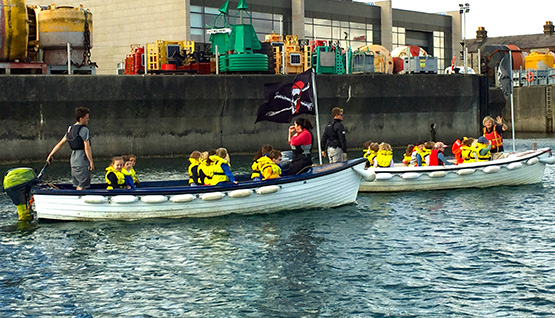 You get them into sailing in gentle stages. With toddlers and infants, just going out on a boat with a feeling of safety is a good first stage – this is Muriel Rumball (lead boat) with the most junior class – some of their parents may themselves be afloat with the INSS learning to sail in larger craft.
You get them into sailing in gentle stages. With toddlers and infants, just going out on a boat with a feeling of safety is a good first stage – this is Muriel Rumball (lead boat) with the most junior class – some of their parents may themselves be afloat with the INSS learning to sail in larger craft.
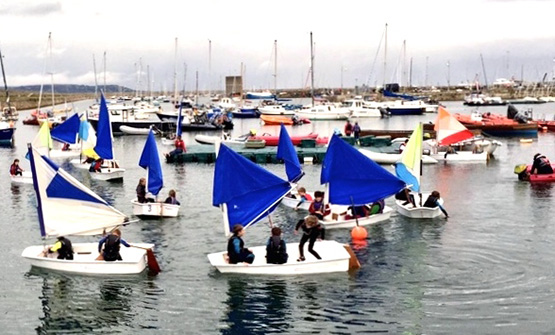 The first stages in sailing should be more about manageability than technical tuning – an Optimist with its sprit out of use lends itself well to fun afloat while gently familiarising the kids with the basics of sailing and getting on with others in the confines of a boat.
The first stages in sailing should be more about manageability than technical tuning – an Optimist with its sprit out of use lends itself well to fun afloat while gently familiarising the kids with the basics of sailing and getting on with others in the confines of a boat.
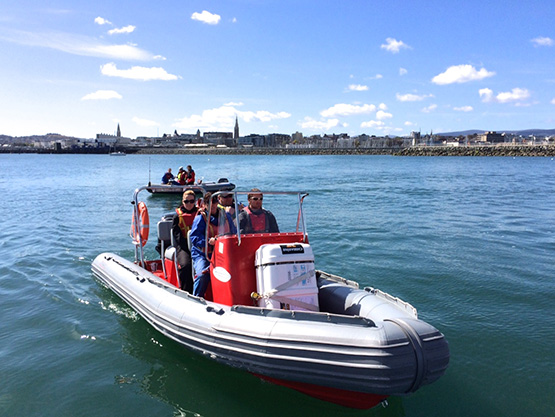 The powerful RIB Sting could be a lethal weapon in the wrong hands, but as she is one of the boats in the INSS Powerboat Course, her competent use is a feature of the school’s activities.
The powerful RIB Sting could be a lethal weapon in the wrong hands, but as she is one of the boats in the INSS Powerboat Course, her competent use is a feature of the school’s activities.
But that was only the start of it, for the school’s popular National Powerboat Course was running for the whole weekend with full turnouts, while the rest of the Schools’ sailing fleet, including 1720s and the Reflex 38 offshore racer, had more than 30 out in adult beginner training courses.
In our report of May 15th, we particularly remembered being in at the beginning of the historic first committee meeting of the newest club in Ireland, the Irish National Sailing Club, which enables the Sailing School alumni to take part in official regattas anywhere, and other open events, for the princely annual subscription of €10.
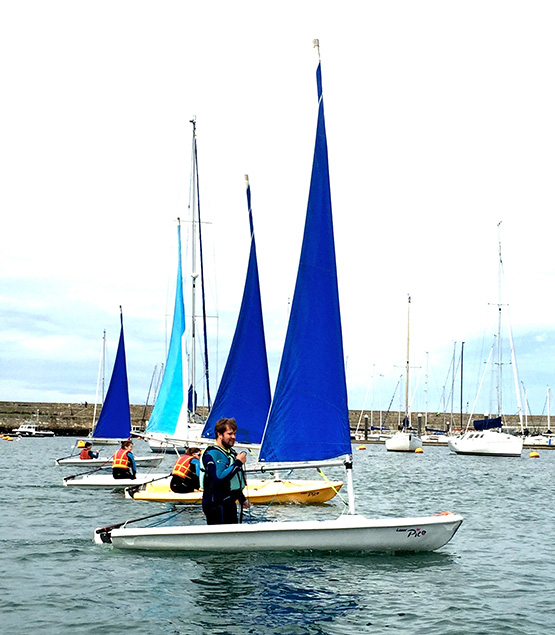 The highly durable Pico is one of the key boats in the INSS’s intermediate courses
The highly durable Pico is one of the key boats in the INSS’s intermediate courses
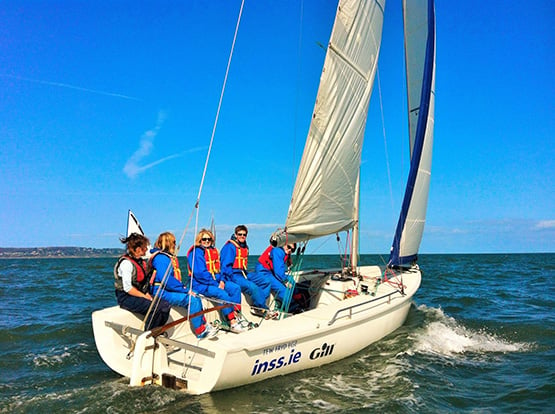 When Tony Castro designed the 1720 Sportboat for a group of Cork Harbour performance enthusiasts back in 1994, he can scarcely have imagined that twenty-one years later a couple of them would be providing ideal training craft for a busy sailing school in Dun Laoghaire
When Tony Castro designed the 1720 Sportboat for a group of Cork Harbour performance enthusiasts back in 1994, he can scarcely have imagined that twenty-one years later a couple of them would be providing ideal training craft for a busy sailing school in Dun Laoghaire
But so worthwhile has the growth and development of the INSC been during 2015 that its members have mustered sufficient numbers to stage their own proper races, and this line of progress also reached a new level on Saturday with the club staging the first INSC Mini-Regatta, with racing for its dinghy classes and well-used Squib fleet.
The regatta even had celebrity participation with noted former international athlete, Senator Eamonn Coughlan, taking part to film part of a documentary called Super Fit Seniors, recording the rapidly improving performance afloat of an 83-year-old whose name we’ve promised not to reveal until the programme is due to be broadcast, but we are allowed to say that if the national policy declares that “Sailing is a Sport for Life”, then on Saturday the INSS was proving it in abundance.
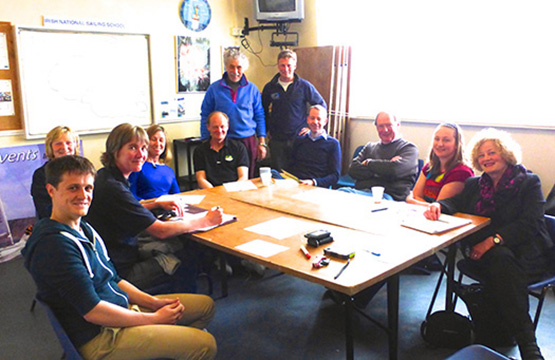 First committee meeting of the Irish National Sailing Club on Monday May 10th 2015. The committee and school management of the newly-formed Club are (left to right) Glyn Williams (foreground), Muriel Rumball, Joan Sheffield, Caroline Herron, Robin Jones, Alistair Rumball, Kenneth Rumball, Garrett O'Malley, Dermot Igoe, Heather Blay and Mary Beck. Photo: W M Nixon
First committee meeting of the Irish National Sailing Club on Monday May 10th 2015. The committee and school management of the newly-formed Club are (left to right) Glyn Williams (foreground), Muriel Rumball, Joan Sheffield, Caroline Herron, Robin Jones, Alistair Rumball, Kenneth Rumball, Garrett O'Malley, Dermot Igoe, Heather Blay and Mary Beck. Photo: W M Nixon
Such is the stature of the Irish National Sailing School that it has been selected as the venue for one of the key assemblies in the up-coming series of Irish Sailing Association Regional Cluster Development Meetings, which seek to improve inter-club relationships and facilitate regional co-operation for the mutual benefit of the many and varied club memberships in specific areas.
The ISA East and Southeast Regional Development Officer Sarah-Louise Rossiter will be holding the meeting for sailing and yacht clubs in the Dublin South Cluster in the Irish National Sailing School from 7.0pm to 9.0pm on Wednesday October 7th.
We can only hope that some of the stardust now exuding from the INSS will waft on to those from other clubs. Alistair Rumball, founder of the INSS way back in 1974, helpfully explains how it’s done: “There’s nothing special to it. You just have to have everyone prepared to work 15 hours a day seven days a week, and be mad keen about teaching and sailing. That’s all it is. Simple as that really”.
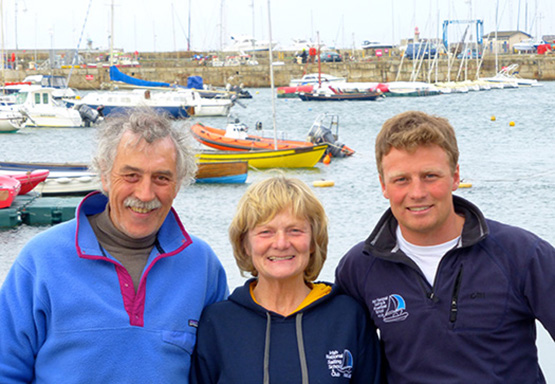
The National Sailing School’s Alistair and Muriel Rumball and their son Kenneth. “You just have to have everyone prepared to work 15 hours a day seven days a week, and be mad keen about teaching and sailing. That’s all it is. Simple as that really”.


























